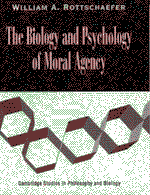Book contents
- Frontmatter
- Contents
- Preface
- Introduction
- PART I MORAL AGENCY AND SCIENTIFIC NATURALISM
- PART II THE BIOLOGICAL BASES OF MORAL AGENCY
- PART III THE PSYCHOLOGICAL BASES OF MORAL AGENCY
- 5 Behaviorally based moral capacities: How do we learn to behave morally?
- 6 The social cognitive bases of morality: How do we learn to act morally?
- 7 The neurophysiological bases of moral capacities: Does neurophysiology have room for moral agents?
- PART IV A SCIENTIFIC NATURALISTIC ACCOUNT OF MORAL AGENCY
- PART V INTEGRATING A PERSONALISTIC AND NATURALISTIC VIEW OF MORAL AGENCY
- References
- Index
5 - Behaviorally based moral capacities: How do we learn to behave morally?
Published online by Cambridge University Press: 19 September 2009
- Frontmatter
- Contents
- Preface
- Introduction
- PART I MORAL AGENCY AND SCIENTIFIC NATURALISM
- PART II THE BIOLOGICAL BASES OF MORAL AGENCY
- PART III THE PSYCHOLOGICAL BASES OF MORAL AGENCY
- 5 Behaviorally based moral capacities: How do we learn to behave morally?
- 6 The social cognitive bases of morality: How do we learn to act morally?
- 7 The neurophysiological bases of moral capacities: Does neurophysiology have room for moral agents?
- PART IV A SCIENTIFIC NATURALISTIC ACCOUNT OF MORAL AGENCY
- PART V INTEGRATING A PERSONALISTIC AND NATURALISTIC VIEW OF MORAL AGENCY
- References
- Index
Summary
MORAL AGENCY AND THE BEHAVIORIST CONNECTION
B. F. Skinner (1971) tells us that the science of operant behavior is the science of values. Using this simple and elegant proposal, we may have a way to link sociobiologically based theories about values with a theory of learning to form an integrated biologically and psychologically based theory of moral agency. The basic reinforcers on which all operant learning builds can be considered from the sociobiological point of view to be evolutionarily based. On the foundation of these basic reinforcers, we can then learn new and complex behaviors that enable us to achieve our goals in complex and changing environments. Can the behaviorist connection provide the necessary supplement to a sociobiological account of moral agency, making it an adequate account of our moral agency? In this chapter, I lay out the major points of Skinner's behaviorist account of moral agency. My goal is to understand and assess Skinner's claim that the science of operant behavior is the science of values and to determine to what extent our moral agency can be accounted for in terms of evolutionarily and operantly based moral capacities. Before we examine the details of Skinner's account of moral agency, let's sketch out some of the distinctive features of both behaviorism and Skinner's own brand of behaviorism.
- Type
- Chapter
- Information
- The Biology and Psychology of Moral Agency , pp. 101 - 124Publisher: Cambridge University PressPrint publication year: 1997



